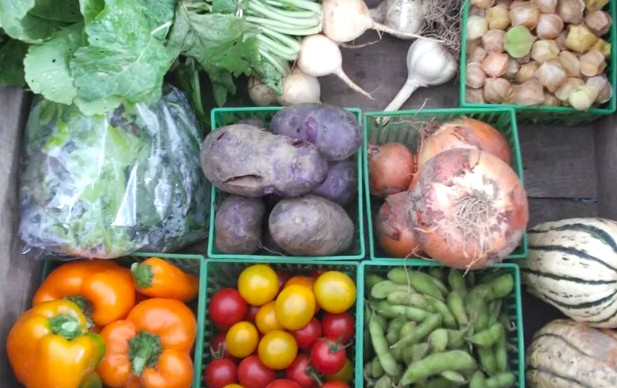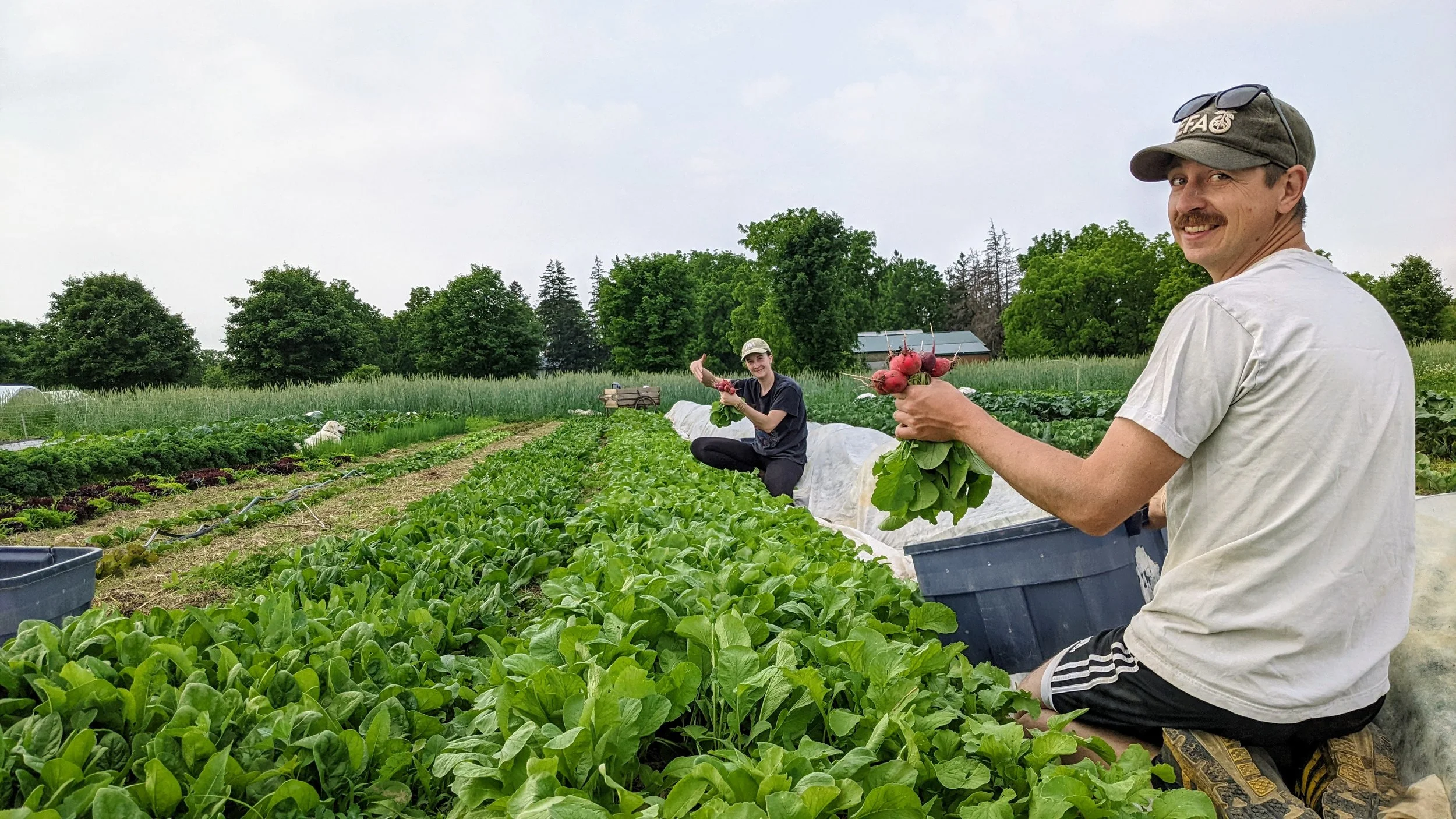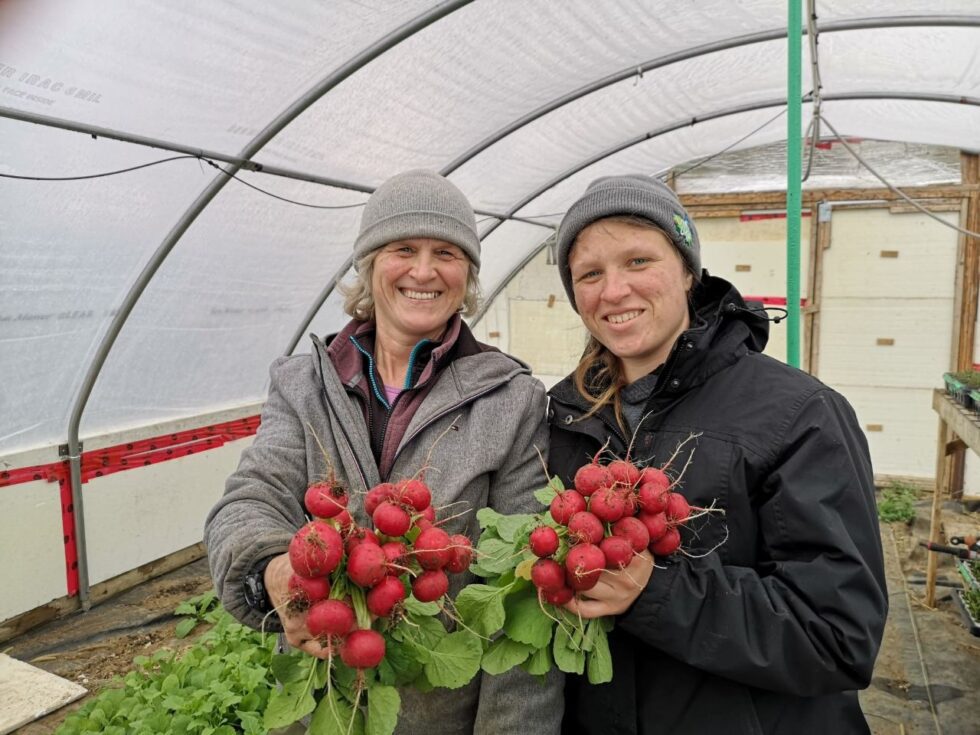Community Supported Agriculture in Canada: Connecting Farmers and Communities
In this post, we explore how CSAs benefit farmers, consumers, and communities, and share two stories from our work in Waterloo Region—Little Fields Farm in Bright and Green Hart Farms near New Hamburg. You’ll also find a link to our national directory so you can discover (or promote) a CSA in your own community.
What Makes Community Supported Agriculture Special?
Among the many ways Canadians are engaging with alternative food systems—farmers’ markets, co-ops, food hubs—CSA offers something distinct: a direct, seasonal partnership between farms and the people they feed.

CSA share from Little Fields Farm
CSA members commit to supporting a farm for the season. In return, they receive regular “shares” of the harvest and participate, in a small but meaningful way, in the successes and challenges of food production. This relationship is built on transparency, trust, and shared commitment—principles that strengthen local food systems from the ground up.
Key Principles of CSA
Though CSA models vary, they typically involve a few key elements.
Member Commitment
At the start of the growing season, members sign up—often paying upfront—to receive a share of the harvest. This early investment gives farmers the resources they need for seeds, supplies, and labour when it’s most critical.
Regular Shares of the Harvest
Throughout the season, members receive a weekly or biweekly share of what the farm produces—typically vegetables, but sometimes also eggs, flowers, meat, or other items.
Shared Risk and Reward
CSA members experience the inherent variability of farming firsthand. A bumper tomato crop one week might be followed by fewer greens if weather or pests intervene. This shared experience fosters deeper understanding and appreciation of local agriculture.
Evolving Models for Diverse Needs
No two CSAs are exactly alike. Increasingly, farmers are adapting the classic model to better meet the needs of their farm and their members. Some of these innovations include:
- Pickup or delivery options, including on-farm, community sites, and home delivery
- Flexible share sizes to suit different household needs
- Fall and Winter shares to access local food year round
- Payment plans or sliding-scale pricing to improve accessibility
- Customizable shares or add-ons from other local producers (e.g., bread, dairy, honey)
This variety allows CSAs to remain rooted in core values while responding to a range of member preferences and capacities.
CSA in Canada: A Snapshot
A 2016 University of Guelph study identified at least 399 CSA farms nationwide. Key findings included:
- CSA farms ranged from urban micro-operations to multi-farm cooperatives
- The average farm size was just over three acres
- 58% of CSA farmers were under 40, indicating strong participation from younger producers
- Only one-third were certified organic, but nearly all reported using organic or ecological practices
These findings highlight the adaptability and sustainability of the CSA model, its appeal to a new generation of farmers, and a strong commitment to ecological practices even without formal certification. Together, they suggest that CSAs play a key role in building resilient, community-focused, and environmentally conscious food systems in Canada.
The Value of CSAs for Farmers, Eaters, and Communities
Community Supported Agriculture programs offer a number of benefits–for farmers, consumers, and communities.
For Farmers
Early-Season Funding
CSA income arrives when it’s most needed—before the first seeds go into the ground. This reduces the need for loans and eases early-season cash flow challenges.
Market Certainty
With committed members, farmers have a reliable market for their harvest. This makes crop planning more efficient and reduces time spent on marketing and distribution.
Community Connection
Many CSA farmers cite the relationships they build with their members as one of the most rewarding aspects of their work. It adds a human dimension to what can otherwise be solitary labour.
For Members
Fresh, Seasonal Food
Members receive high-quality produce grown locally and harvested at peak freshness. Many also discover new vegetables or varieties they haven’t tried before.
Transparency and Connection
Knowing where food comes from—and who grew it—deepens food literacy. Some farms share regular newsletters, growing updates, or recipe suggestions to help members make the most of their shares.
Participation in Food Systems
CSA members often report feelings of connection and solidarity with their farm community. From shared meals to volunteer days, many farms offer ways to engage beyond the box.
For Communities and the Environment
Supporting Local Economies
CSA dollars stay local, supporting the livelihoods of farmers, their staff, and their suppliers. These funds recirculate within the regional economy rather than leaving it.
Reducing Environmental Impact
CSAs reduce the distance food travels, cut down on packaging, and often promote regenerative practices that support long-term soil health.
Food System Resilience
By directly connecting consumers to local production, CSAs contribute to greater regional food security and less vulnerability to food chain disruptions.
Research conducted by the Organic Agriculture Centre of Canada on Alberta’s agricultural communities found that farms participating in local food systems report 25% higher net returns and create three times more local jobs than those focused solely on commodity markets. These systems also strengthen community food security, with 65% of participating farms expanding production during recent supply chain disruptions.
Stories from the Field: CSA Farmers in Waterloo Region
Behind the big picture are hundreds of farmers designing new ways to grow food, manage risk, and connect with eaters. Thanks to our work in Waterloo Region, we’ve had the chance to meet a few of them and learn how they’re bringing CSAs to life.

Little Fields Farm: Claire + Adam
When Claire founded Little Fields Farm in 2015, she brought a love of the outdoors, a deep appreciation for good food, and a commitment to sustainability. Years of interning on organic farms in Ontario and British Columbia shaped her hands-on approach. In 2021, she was joined by her partner Adam, whose lifelong connection to agriculture and experience leading a community market garden helped turn Little Fields Farm into a vibrant CSA farm.
Read the full story to see how Claire and Adam are taking their small-scale farm into a sustainable future.

Green Hart Farms: Kendra + Linda
Run by a mother-daughter team, Green Hart Farms has focused on creating one of the best CSA experiences possible. Using ecological methods to grow vegetables and flowers, Linda and Kendra offer flexible shares and a range of benefits designed to make eating local food easy for busy families.
Read the full story to see how Kendra and Linda are making fresh, local food more convenient than ever.
Getting Involved in CSA
Whether you’re a farmer exploring business models, a consumer looking for a closer connection to your food, or a community organization working to support local food systems, there are many ways to engage with CSA:
- Find a CSA near you or list your farm in our national directory
- Share your CSA experience—with colleagues, neighbours, or on social media
- Support local food initiatives—from farm-to-school programs to municipal food strategies
CSA isn’t a one-size-fits-all solution, but it remains one of the most accessible and adaptable tools for strengthening regional food systems. When people and farms work together, even small steps—like signing up for a share or supporting a local producer—can lead to lasting change.

Open Food Network is a free and open source software platform. Our content is licensed with CC BY-SA 3.0 and our code with AGPL 3.
We take good care of your data. See our cookies policy
